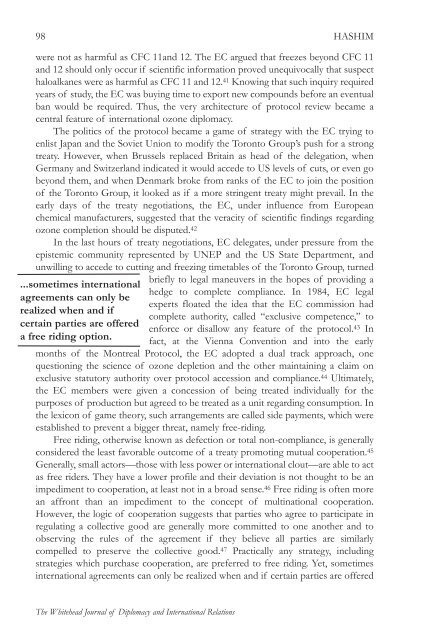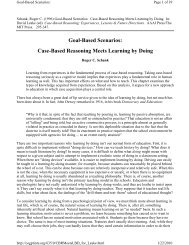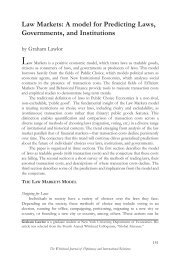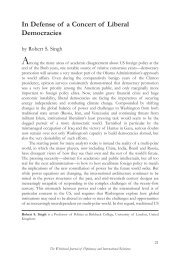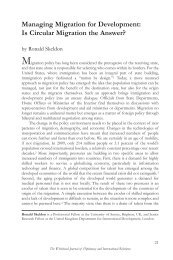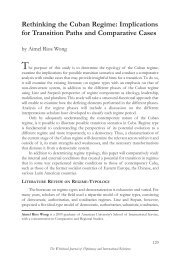Free Riders, Side Payments, and International Environmental ...
Free Riders, Side Payments, and International Environmental ...
Free Riders, Side Payments, and International Environmental ...
Create successful ePaper yourself
Turn your PDF publications into a flip-book with our unique Google optimized e-Paper software.
98<br />
The Whitehead Journal of Diplomacy <strong>and</strong> <strong>International</strong> Relations<br />
HASHIM<br />
were not as harmful as CFC 11<strong>and</strong> 12. The EC argued that freezes beyond CFC 11<br />
<strong>and</strong> 12 should only occur if scientific information proved unequivocally that suspect<br />
haloalkanes were as harmful as CFC 11 <strong>and</strong> 12. 41 Knowing that such inquiry required<br />
years of study, the EC was buying time to export new compounds before an eventual<br />
ban would be required. Thus, the very architecture of protocol review became a<br />
central feature of international ozone diplomacy.<br />
The politics of the protocol became a game of strategy with the EC trying to<br />
enlist Japan <strong>and</strong> the Soviet Union to modify the Toronto Group’s push for a strong<br />
treaty. However, when Brussels replaced Britain as head of the delegation, when<br />
Germany <strong>and</strong> Switzerl<strong>and</strong> indicated it would accede to US levels of cuts, or even go<br />
beyond them, <strong>and</strong> when Denmark broke from ranks of the EC to join the position<br />
of the Toronto Group, it looked as if a more stringent treaty might prevail. In the<br />
early days of the treaty negotiations, the EC, under influence from European<br />
chemical manufacturers, suggested that the veracity of scientific findings regarding<br />
ozone completion should be disputed. 42<br />
In the last hours of treaty negotiations, EC delegates, under pressure from the<br />
epistemic community represented by UNEP <strong>and</strong> the US State Department, <strong>and</strong><br />
unwilling to accede to cutting <strong>and</strong> freezing timetables of the Toronto Group, turned<br />
briefly to legal maneuvers in the hopes of providing a<br />
hedge to complete compliance. In 1984, EC legal<br />
experts floated the idea that the EC commission had<br />
complete authority, called “exclusive competence,” to<br />
enforce or disallow any feature of the protocol. 43 In<br />
fact, at the Vienna Convention <strong>and</strong> into the early<br />
months of the Montreal Protocol, the EC adopted a dual track approach, one<br />
questioning the science of ozone depletion <strong>and</strong> the other maintaining a claim on<br />
exclusive statutory authority over protocol accession <strong>and</strong> compliance. 44 Ultimately,<br />
the EC members were given a concession of being treated individually for the<br />
purposes of production but agreed to be treated as a unit regarding consumption. In<br />
the lexicon of game theory, such arrangements are called side payments, which were<br />
established to prevent a bigger threat, namely free-riding.<br />
<strong>Free</strong> riding, otherwise known as defection or total non-compliance, is generally<br />
considered the least favorable outcome of a treaty promoting mutual cooperation. 45<br />
Generally, small actors—those with less power or international clout—are able to act<br />
as free riders. They have a lower profile <strong>and</strong> their deviation is not thought to be an<br />
impediment to cooperation, at least not in a broad sense. 46 <strong>Free</strong> riding is often more<br />
an affront than an impediment to the concept of multinational cooperation.<br />
However, the logic of cooperation suggests that parties who agree to participate in<br />
regulating a collective good are generally more committed to one another <strong>and</strong> to<br />
observing the rules of the agreement if they believe all parties are similarly<br />
compelled to preserve the collective good. 47 ...sometimes international<br />
agreements can only be<br />
realized when <strong>and</strong> if<br />
certain parties are offered<br />
a free riding option.<br />
Practically any strategy, including<br />
strategies which purchase cooperation, are preferred to free riding. Yet, sometimes<br />
international agreements can only be realized when <strong>and</strong> if certain parties are offered


